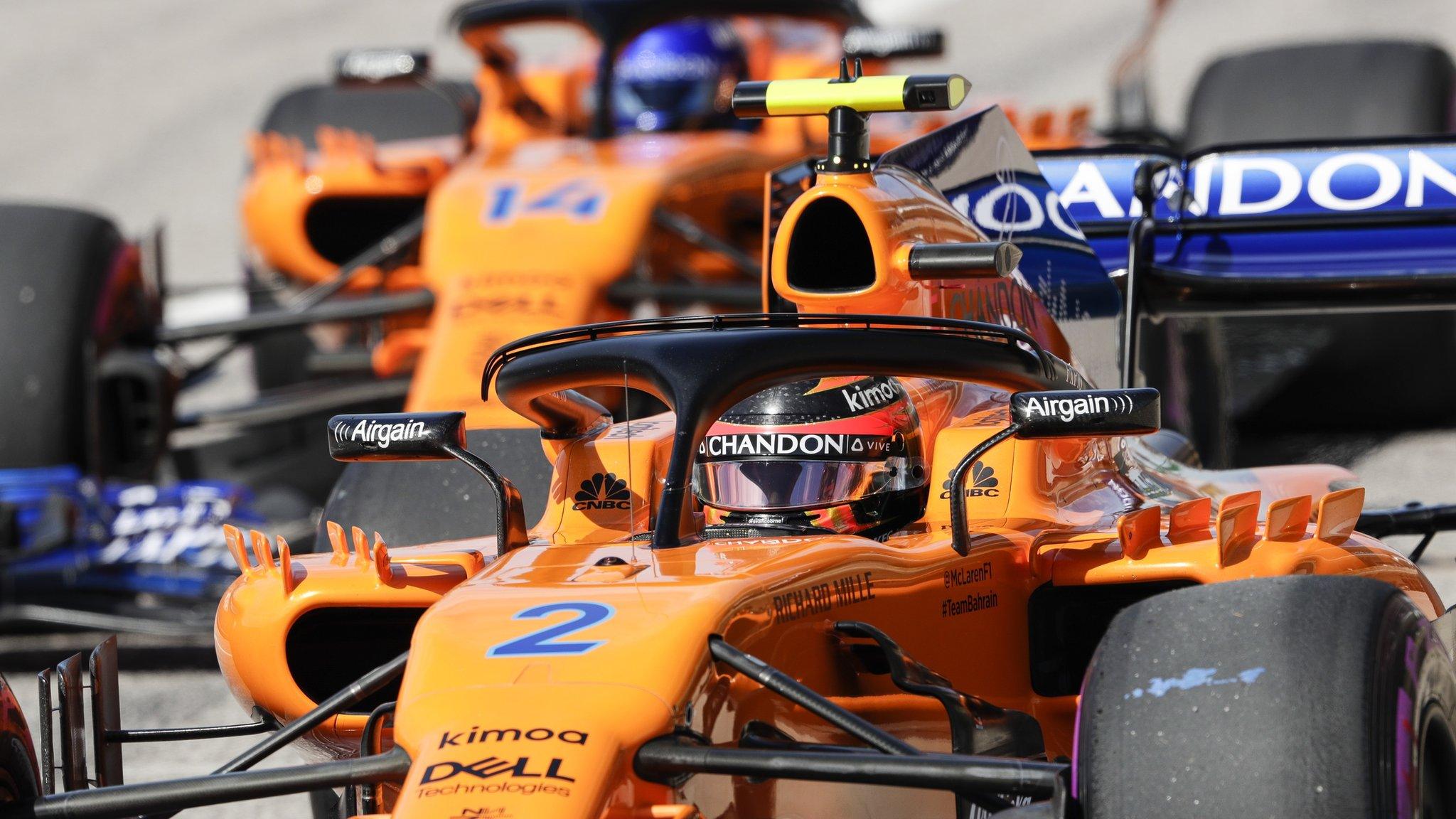Formula 1: Seven key issues facing the sport's bosses for the 2019 season
- Published
- comments
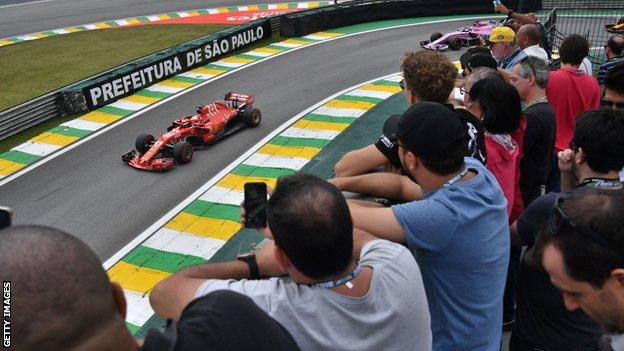
What can Formula 1 fans expect from the sport in the coming years?
Formula 1's bosses are heading into 2019 facing a critical period as they try to impose their vision on the sport.
Liberty Media's stewardship has produced mixed results since the US group took over in January 2017.
There is a more open atmosphere in F1, and a new race in Vietnam in 2020, but a number of historic events are under threat and teams' prize money has consistently dropped over the past 18 months.
Rule changes planned for 2021 have not yet been revealed, F1 has already lost one battle with the teams, and there is no agreement in other key areas.
And 2020, when all but one of the teams' contracts with F1 end, looms ever closer.
High-profile races under threat
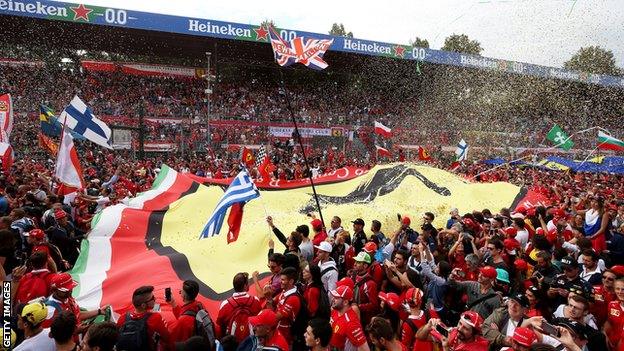
Monza is one of the most well-attended races on the F1 calendar
Perhaps the biggest single issue facing F1 is the fact the contracts of five races expire next season.
Along with the British Grand Prix, which exercised a break clause in its contract after 2019, the races in Germany, Italy, Spain and Mexico are also heading into the last year of their contracts.
The concern for F1/Liberty is all will want to renew at a lower rate than they are paying. And insiders say the circuits are working together on the matter to strengthen their hands.
Silverstone said it ended its contract because it could not afford to carry on at the escalating rates stipulated in the agreement it made with former F1 boss Bernie Ecclestone in 2009.
It wants to continue, but it and F1 are some way apart on their ideas of an acceptable fee.
Losing any of these races would be bad news - Liberty is trying to expand F1, not shrink it. The absence of Britain, Italy and/or Germany would be an especially awkward look when Liberty has said it values the classic European historic races and is determined to preserve them.
And, even if none of these events is among F1's biggest earners, any race that drops off the calendar means a significant loss of income - Silverstone is paying more than £18m next year; Italy €24m (£21.4m) and Mexico a reported $25m (£19.7m).
A defeat on engines; what of the other rules?
Liberty took over F1 with plans to make it more competitive and increase its appeal to spectators, restructure prize money so it is distributed more equitably, and impose a budget cap.
It has already lost one battle - F1 has been forced to backtrack on plans to simplify the turbo hybrid engines from 2021 following opposition from the car manufacturers.
Against F1's original wishes, the heat-energy recovery unit at the heart of both the engines' remarkable efficiency and their complexity will stay. And it's quite possible plans to loosen fuel limits will also be dropped on the same basis - why incur the cost of changing the engines, the manufacturers say, when no-one else is interested in entering?
At least on engines people generally know where things are going. On other issues, the water is muddier.
There has been no sign of the new technical rules for 2021, with which F1 plans to change aerodynamics to make it easier for cars to follow each other closely, thereby improving the racing.
Technically, the rules are the responsibility of the FIA. But F1 has set up a significant department under sporting boss Ross Brawn to research the issue. The two are said to be working together.
Why the delay? F1 says it's deliberate - it doesn't want to give the teams too much notice, to try to prevent the better-resourced stealing a march.
But a truncated time period also favours the bigger teams - because they can put more people on it, and learn more at a faster rate.
What about money?
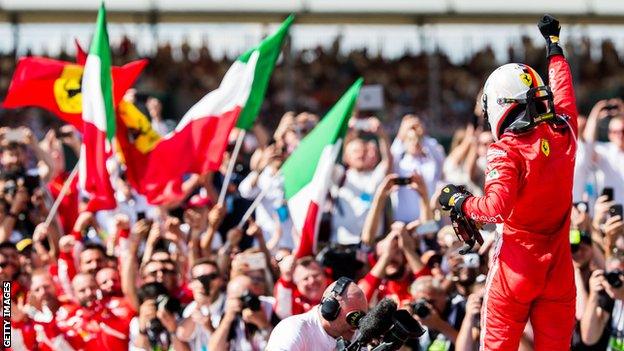
Ferrari received the largest share of F1's prize money despite finishing behind Mercedes in the drivers' and constructors' championships
Back in April, F1 presented the teams with a plan to change income distribution and introduce a budget cap from 2021.
F1 wants to reform a prize-money system which disproportionately rewards the top teams - the legacy of one of Ecclestone's myriad divide-and-conquer strategies back in 2011.
Money will still be distributed on a performance-related basis, but the disparity between first and last will be significantly reduced.
The exact prize-money structure has not been revealed. But sources say that, in essence, the teams have been offered a protected level of income - but little chance for it to go up significantly, even if F1's profits increase.
The bonuses that rewarded Ferrari, Red Bull, McLaren, Williams and Mercedes will go. In their place, engine manufacturers will be given a $10m (£7.9m) bonus, and Ferrari an additional $40m (£31.5m) because of their status.
For many months, no further talks took place on this, and teams were beginning to get nervous and edgy. In late October, F1 boss Chase Carey moved to calm them by instigating a series of regular meetings, and discussions have started to inch forward.
Publicly, the teams say talks are going in the right direction. However, privately not all have the same position - and Mercedes and Ferrari, in particular, are said to be steadfast in their unwillingness to accept the proposal presented by F1 so far.
And the budget cap?
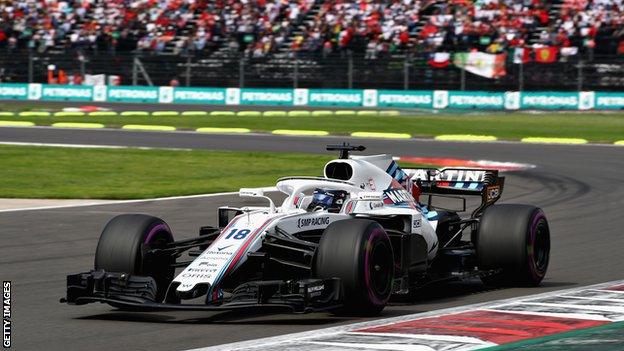
Williams deputy team boss Claire Williams has said the team "will close" if F1 doesn't introduce a budget cap
Liberty proposed a budget cap of $150m (£118m) in 2021, the idea being to reduce the performance gap between the top three teams - who are all spending close to double that amount - and the rest.
Now, it is proposed there is a glide path down to it, with the first year set at $200m (£157.3m), then $175m (£137.6), before settling on $150m (£118m). There is also talk of delaying the start of it until 2022 or even 2023.
The problem is, every year that goes by before the cap is introduced is more time for the big teams to invest in resources and equipment that will entrench their advantage for years to come.
There is also the issue of satellite teams. Some argue a budget cap will simply increase the likelihood of big teams 'buddying up' with smaller outfits to spread resources, increase economies of scale, and make it impossible for the authorities to work out who is doing what work for which team.
This presents an existential threat to teams such as Renault, McLaren and Williams, who are not involved and believe this runs counter to the fundamental tenets of F1. They have been told it will be stopped - but not how.
Broadcasting - especially in the UK
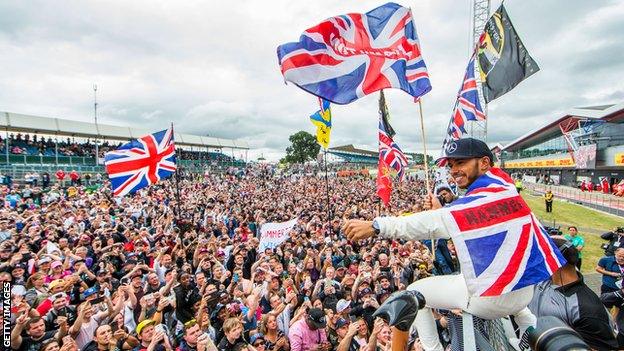
Channel 4's coverage of the British Grand Prix averaged 2.39 million viewers
For the first time since the mid-1970s, live broadcasting of F1 will be almost non-existent on free-to-air television in the UK next year.
A lucrative new contract with Sky, signed by Ecclestone in 2016, kicks in. It dictates only the British Grand Prix must be live on free-to-air, along with highlights of all the other races. Channel 4 will broadcast this in 2019.
Sky paid handsomely to own the rights to show live F1 in the UK - the contract, until 2024, is said to be worth £1.2bn.
But what effect could it have on F1's public appeal? Will it prosper, as football has? Or suffer, in the manner of cricket? Many feel they already know the likely answer to that.
Beyond 2019, there is another question. The C4 deal is for only one year. Will Sky, which owns the rights, extend it, or switch free-to-air coverage to one of its own channels?
The latter would meet the requirements of the Sky contract that the free-to-air coverage must have "90% technical availability" to the public. But it would risk diminishing the audience even further.
Sources say Sky's plan as things stand is to promote its Pick channel through 2019 as a place people will be able to see F1, and then use it to meet its free-to-air obligations in 2020.
If so, how does that fit with F1's desire to grow the audience? And will the sport's bosses try to pressure Sky to think again?
Is F1 meeting its own targets?
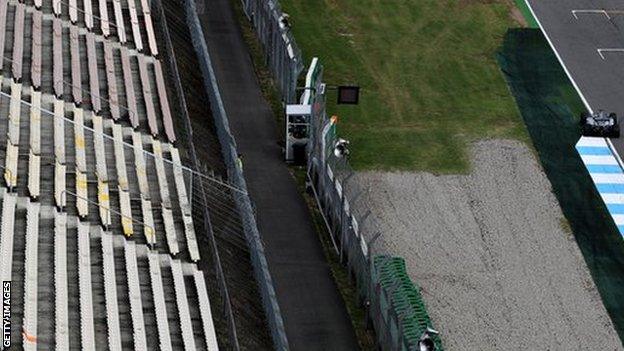
Empty grandstands, particularly during practice sessions, have been a problem for F1 in recent years
Liberty bought F1 professing its plans to grow both its audience and its income.
On-track audiences are up, TV audiences have increased by about 3% from 2017 to 2018, and its social media following has ballooned.
But the teams' payments have decreased slowly but consistently for the past 18 months - largely because of greatly increased overheads at F1, which has new central London offices, and significantly more staff.
In terms of TV, it is hard to discern a clear strategy behind F1's oft-repeated mantra that it wants a split between free-to-air, pay and what is known as OTT, or selling direct to the audience.
In Europe, F1's main market, Liberty has negotiated two new deals since it took over. One, in Italy, saw it move predominantly to pay-per-view, in an effective mirror of the new UK deal. Another, in Germany, extended its relationship with free-to-air on RTL, with pay TV dropped.
So, of the sport's three biggest European markets, live coverage is now almost exclusively on pay TV in two, and free-to-air survives substantially in only one.
The thorny issue of tyres
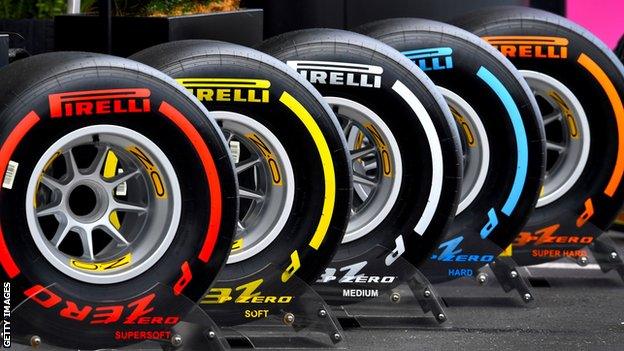
Pirelli's new tyre supply contract comes amid pressure from drivers for less sensitive tyres that allow them to push harder in races
To improve the racing, Liberty says it is addressing aerodynamics, and its effect on the ability of a car to closely follow another, in the 2021 rules.
Yet the drivers have been saying for some years that one of the key problems preventing them racing harder and closer is the tyres.
The Pirelli tyres are prone to overheating, and this restricts how hard drivers can push in races. In effect, although the car could go faster, in a race stint there is a maximum optimum lap time before the tyres are pushed over the edge.
Drivers have to keep the tyre below its surface-temperature limit for the average of the lap or stint. Push harder, and the tyres overheat and lose performance.
This is why race lap times are so much further off qualifying pace than can be accounted for by fuel load or engine modes - by a number of seconds - and why drivers spend most races trying to make a one-stop strategy work.
Doing more pit stops is counter-productive - because the tyres won't let the driver push harder to make up the lost time, despite the car going much slower than it is capable of.
The result is "the races aren't fun," as Haas driver and Grand Prix Drivers' Association director Romain Grosjean puts it. Not only that, he says, but if drivers aren't on the limit, they aren't going to make a mistake - and errors liven up races.
Try to question Brawn on this, and he simply refuses to engage.
In recent weeks, the drivers have started a renewed push for what in unguarded moments they would call better tyres.
Not all racing tyres behave like this, and one possible way of enabling drivers to race harder - as Liberty says it wants them to - would have been to explore the idea of another supplier during the recent tyre tender period.
F1 dismissed Michelin, whose tyres are driven flat out by the leading cars in the World Endurance Championship, because it felt its philosophy did not fit.
Korea's Hankook, which supplies the DTM German touring car championship, was a rival for Pirelli but in the end the Italian company secured a new contract until 2023.
Did Liberty do this deal because it genuinely believed Pirelli could produce the tyres the drivers want, even though their characteristics have been fundamentally the same since its debut in 2011? Or because fiscal issues trumped sporting ones, and the lucrative Pirelli deal was needed at a time when finances are under pressure? Or both?
Some team bosses admit F1 needs to end the era of excessive tyre management. Mercedes boss Toto Wolff says it is "completely the wrong direction - we need robust tyres, that Pirelli is perfectly able to produce. They just need to be given the right objectives."
It's too late to change the tyres for 2019, but if Pirelli does not make significant changes for 2020, what then?
- Published3 December 2018
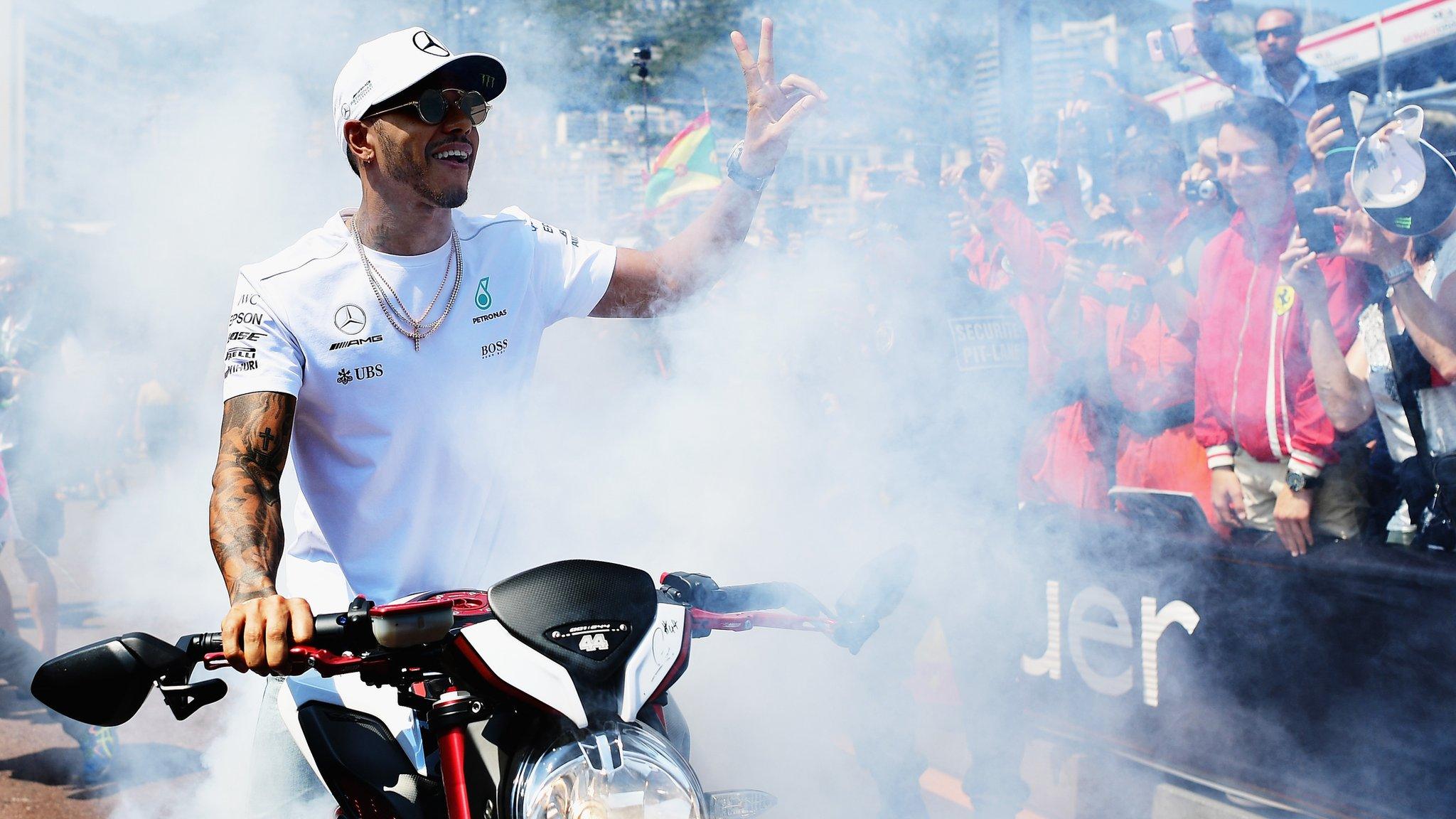
- Published27 November 2018
